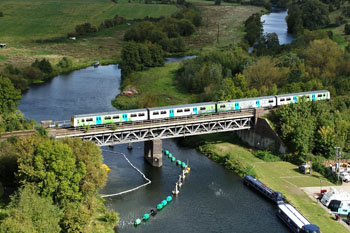TRL will this year launch a new academic service to support organisations in the 'new aspects' of the transition to zero-carbon transport.
The transport research body said the service will be launched by the TRL Academy and will aim to support the public and private sectors, as well as other academic institutions.

A HydroFLEX hydrogen train
TRL has published a paper on Decarbonising Transport by its head of environment and decarbonisation, Dr Anthony (Toni) Velazquez Abad.
The paper argues that the Government’s ‘Green Industrial Revolution vision’ requires the development of an ‘immediate, comprehensive and well-funded’ decarbonisation plan that is ‘built around a broader industrial strategy that considers carbon prices and other environmental, social and economic policies [and] positions the country in the right path to meet the UK interim carbon budgets and achieving net zero by 2050’.
It adds: ‘This will require major changes to how people and goods move, implemented through a system-based approach.’
In relation to the role of transport in the Government’s 2050 zero carbon target, the paper argues that ‘we need to make progress now decarbonising even the most difficult transport modes by promoting active travel, electro-mobility…and alternative low carbon fuels for rail, shipping and aviation.’
The paper notes that in March 2020, the Department for Transport published a consultation ahead of its transport decarbonisation strategy, which ‘spells out the size of the emissions reduction challenge that we need to overcome’.
As Transport Network has reported, the plan was due by the end of last year but has been delayed.
The paper states: ‘In the meantime, the UK must adapt to the climate emergency and build a more resilient transport system. While the strategic road network and some ports seem relatively well prepared for climate risks, local authority managed roads and rail may be less so, with airports tending to be more reactive.’
It adds: ‘National and local road investment strategies to build and maintain roads and infrastructure assets must play their part to mitigate climate change too. This means a revolutionary shift towards the use of more sustainable materials, construction and maintenance techniques, which will require the rapid development of new standards and guidance for the construction industry, designing infrastructure for circularity.’
Register now for full access
Register just once to get unrestricted, real-time coverage of the issues and challenges facing UK transport and highways engineers.
Full website content includes the latest news, exclusive commentary from leading industry figures and detailed topical analysis of the highways, transportation, environment and place-shaping sectors.
Use the link below to register your details for full, free access.
Already a registered? Login